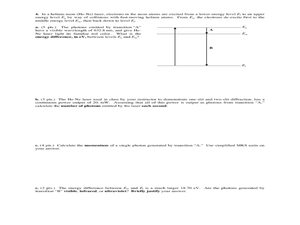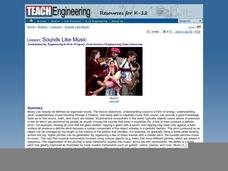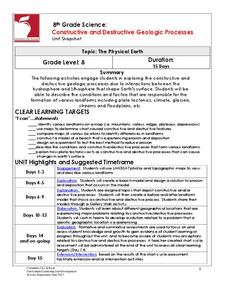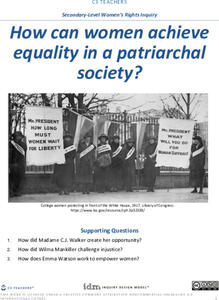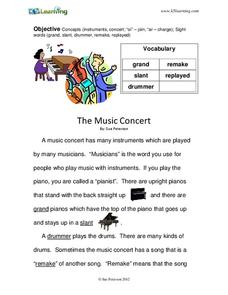Curated OER
Identifying the Adjectives
In this grammar activity, students identify the adjectives in ten sentences. For example, "The sweaty man is running" and "A funny clown is waving to me."
Curated OER
Computer Software and ACS Materials for Chemistry
Young scholars use computer software to simulate chemistry laboratory experiments. In this experimenting using computer software lesson plan, students use software called "The One Computer Classroom" to investigate wave simulations as a...
Curated OER
Worksheet 4-1 Atomic Spectra
In this atomic spectra worksheet, students answer eighteen questions about wavelengths of light, the emission spectrum, energy of photons, the frequency of electromagnetic radiation and electrons in the excited state.
Curated OER
Measuring the Wavelengths of Visible Light
Pupils demonstrate use of an Emission tube power supply, a diffraction grating, and a scientific calculator to determine the different wavelengths of light.
Curated OER
Interactive Online Light Activity
Students participate in an online interactive activity in which they discover types of light, wavelengths of light, and how astronomers use different wavelengths. Activity includes links for other activities and lab activities including...
Curated OER
Gallery Walk Questions on Earth's Radiation Balance
Questions that can be used in a lesson on Earth's radiation balance are suggested in this resource. It is not a lesson plan, per se, but it is a list of questions for stations within a "Gallery Walk" lesson. The link to how Gallery Walks...
Curated OER
The Electromagnetic Radiation (Light ~ the Supreme Informant!)
This short slide show applies the electromagnetic spectrum to astronomy. First, electromagnetic radiation is introduced to viewers. Wavelength is defined and its unit of measurement explained. Finally, aspiring astronomers find that the...
International Technology Education Association
Make a Pinhole Camera
With a little light and a lot of time, you can create some amazing images. This NASA-related task instructs pupils to build a pinhole camera. The lesson provides suggestions for different pictures to try with the pinhole camera...
US Department of Energy
Sunlight and Evaporation
Here is a simple inquiry experiment designed to demonstrate that the energy from sunlight can evaporate water. Young scientists follow provided procedural steps to construct a model of our atmosphere using a bowl, a cup, water and...
Curated OER
The Photoelectric Effect
A single-page worksheet describes the photoelectric effect of metals exposed to light. The kinetic energy equation is given, and physicists learn how to use it for problem solving. Compact in content, this can be used as a homework...
Curated OER
Physics Final Exam
A two-hour final exam covers a range of physics topics related to electricity and magnetism. It employs a variety of methodologies for assessing your physics learners' understanding and mastery of these concepts. You will need to review...
Curated OER
Starlight, Star Heat
In this stars worksheet, students read how astronomers calculate the temperature of a star by measuring its color. Students use a chart showing star temperatures and colors to complete 3 short answer questions.
Curated OER
The Speed of Galaxy Q2125-431
In this speed of a galaxy worksheet, students use a given equation for the speed of an object and they use the spectral lines for Hydrogen Alpha and Beta from the Seyfert galaxy to answer 6 questions. They determine the observed...
Curated OER
Sounds Like Music
Students define and examine the connections between sound and music and how engineers design instruments. They listen to examples of musical instruments, view a demonstration of a tuning fork and bottles filled with varying amounts of...
Alabama Learning Exchange (ALEX)
Sonar Mapping of the Ocean Floor
Eighth graders participate in an experiment that emulates a sonar signal bouncing off the ocean floor. They determine how the ocean floor is measured by the length of time it takes for the sonar signal to return. They work with a wooden...
Curated OER
Epicenters
In this earthquake worksheet, students use seismographs to determine how far away the cities were from the epicenter of an earthquake. This worksheet has 1 graphic organizer.
Curated OER
Woody Sine
Students explore the concept of sine. In this sine lesson, students create a sine graph from tooth picks. Students create a unit circle with tooth pick length radius. Students then take the tooth picks from the unit circle and put them...
Curated OER
Diffraction of Laser Light, Polarization and Color Filters
Students investigate light behavior by conducting a series of experiments. In this physics instructional activity, students calculate the wavelength of the light source using an equation. They determine what color is produced when light...
Columbus City Schools
Constructive and Destructive Geologic Processes
Show the class the world as they've never seen it before—from way above! Learners try to unravel the mysteries presented by rich satellite imagery, learn to interpret topographic maps, and study erosion by constructing their very...
Discovery Education
Market Research and Design: The Headphone Challenge
Watch augmented reality bring classrooms to life. Scholars work in groups to design, build, and market a new pair of headphones meant for children under three. They use an augmented reality app to show their headphones in action as they...
C3 Teachers
Women’s Rights: How Can Women Achieve Equality in a Patriarchal Society?
Women today may not have heard of Madame C.J. Walker or Wilma Mankiller, and a few may not be aware of Emma Watson's current role; however, they have certainly benefited from their efforts. Using questions supplied by this guided...
Green Education Foundation
How Loud is Too Loud?
Ever wonder how loud a sound has to be to cause damage? Young scientists explore sound properties by researching decibel levels. They discuss how sound is perceived by our ears and our brains and why it can cause negative health effects...
Benjamin Franklin High School
Saxon Math: Algebra 2 (Section 9)
Section 9 of the 12 linked Saxon Math sections introduces the young algebrist to graphing periodic functions, creating graphs from quadratic roots, working with inequalities, and rational equations. Common among all the lessons is the...
K5 Learning
The Music Concert
Second graders read an informational text passage on music concerts and then answer questions based on what they read.
Other popular searches
- Sound Waves
- Light Waves
- Waves Physics
- Tidal Waves
- Light and Sound Waves
- The Wave by Todd Strasser
- Electromagnetic Waves
- Wavelength
- Electromagnetic Wave
- Seismic Waves
- Ocean Waves
- Transverse Wave










